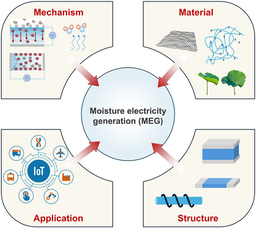BMC Global and Public Health: New journal to advance SDG research
Published in Healthcare & Nursing

The new selective BMC journal BMC Global and Public Health is now open for submissions. The journal will consider important advances and influential research and opinion in all areas of global and public health, and we will publish a unique set of high-impact content including Research, Systematic Reviews, Registered Reports, as well as Reviews, Comments, Forums, Perspectives and Matters Arising. Our goals are to give a voice to the communities we aim to serve, to promote health and well-being, and to advance health equity and policy making worldwide.
As the pioneer in open access publishing, BMC already has an excellent standing within the public health communities, especially owing to our largest title BMC Public Health. By launching this new selective journal, we aim to connect and support the global and public health communities around the world, which will enable us to have an even further reach and impact.
In line with BMC’s mission, BMC Global and Public Health will champion open science and immediate data sharing, supported by transparent peer review and open data policies, as well as adherence to community standards and policies. We are committed to promoting Diversity, Equity and Inclusivity, with appropriate community representation among journal stakeholders and topics covered. We are lucky to already have the support of an Editorial Board with broad and diverse expertise, and we will keep on expanding its size and scope, with a specific focus on Early Career Researchers. We have launched the journal with two guest-edited article collections that cover highly topical issues in global and public health: Stigma and mental health in infectious diseases, and Identifying people with tuberculosis and linking to care: finding the missing millions. For more details and to submit your manuscript, please see the journal website here.
We look forward to working with you.
Follow the Topic
-
BMC Global and Public Health

An open access, transparent peer review journal publishing outstanding and influential research and opinion of broad interest to all professional communities involved in global and public health research, policy-making, implementation and delivery worldwide.
Related Collections
With Collections, you can get published faster and increase your visibility.
Understanding the HIV care continuum: Progress and challenges
BMC Global and Public Health is calling for submissions to our Collection on understanding the complexities and advancements in global health frameworks. This Collection will highlight key findings and challenges in maintaining continuity of care for populations affected by HIV across diverse regions.
This Collection aims to explore the multifaceted nature of HIV care, examining the ongoing challenges and recent advances in care delivery systems. We welcome contributions that offer a comprehensive understanding of how access to care, quality of treatment, and sustained engagement with healthcare systems impact health outcomes for individuals living with HIV.
Potential topics include but are not limited to:
The role of diagnosis and early detection in improving long-term health outcomes
Strategies for improving linkage to care and retention in care
The impact of antiretroviral therapy in managing HIV
Barriers to viral suppression and achieving optimal care continuity
Innovations in pre-exposure prophylaxis (PrEP) for at-risk populations
The influence of socioeconomic, cultural, and political factors on HIV care accessibility
This Collection aims to contribute to a more thorough and collaborative understanding of HIV care challenges worldwide, focusing on solutions and the pathways needed to support people living with HIV, ensuring their access to effective, ongoing care. We look forward to receiving innovative and impactful research that will push the boundaries of our current knowledge.
We encourage work from local, regional, national, and global partnerships and collaboration among multidisciplinary scientists using multiple methodologies. We ask that authors be careful to use non-stigmatizing/preferred language in their manuscripts as outlined in relevant language guidelines for their respective fields.
This Collection supports and amplifies research related to SDG 3: Good Health and Well-being and SDG 10: Reduced Inequalities.
All manuscripts submitted to this journal, including those submitted to collections and special issues, are assessed in line with our editorial policies and the journal’s peer-review process. Reviewers and editors are required to declare competing interests and can be excluded from the peer review process if a competing interest exists.
Publishing Model: Open Access
Deadline: Mar 18, 2026
Food security, nutrition, and dietary trends
BMC Global and Public Health is calling for submissions to our Collection on food security, nutrition, and dietary trends. These are interconnected elements that profoundly impact global health and well-being. As the world grapples with rapid population growth, climate change, and economic disparities, the challenges surrounding food access, quality, and sustainability have intensified. This Collection aims to gather diverse research that examines these complex relationships, focusing on how dietary patterns, food availability, and nutritional status influence overall health outcomes. By exploring the multifaceted nature of food systems, this Collection seeks to showcase pathways to achieve improved food security and nutritional health worldwide.
The goal of this Collection is to build a comprehensive body of knowledge that informs policy and practice. We encourage submissions that investigate:
Impact of dietary patterns on health outcomes
Addressing food insecurity through policy
Role of ultra-processed foods in nutrition
Personalized nutrition and dietary therapy
Nutritional supplements for malnutrition
This Collection supports and amplifies research related to SDG 2: Zero Hunger and SDG 3: Good Health and Well-Being.
We encourage work from local, regional, national, and global partnerships and collaboration among multidisciplinary scientists using multiple methodologies. We ask that authors be careful to use non-stigmatizing/preferred language in their manuscripts as outlined in relevant language guidelines for their respective fields.
All manuscripts submitted to this journal, including those submitted to collections and special issues, are assessed in line with our editorial policies and the journal’s peer-review process. Reviewers and editors are required to declare competing interests and can be excluded from the peer review process if a competing interest exists.
Publishing Model: Open Access
Deadline: May 28, 2026



Please sign in or register for FREE
If you are a registered user on Research Communities by Springer Nature, please sign in